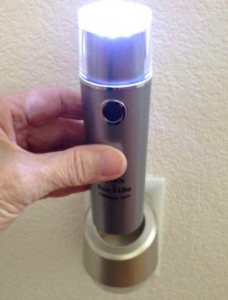 At about 4:30 p.m. last Saturday, with temperatures hovering around 92 degrees, I was working at my desk when WHAM!, the power went off.
At about 4:30 p.m. last Saturday, with temperatures hovering around 92 degrees, I was working at my desk when WHAM!, the power went off.
Before I could even get up from the chair a few things happened:
• My computer battery back-up started beeping.
• Our home alarm system started beeping.
• All our emergency wall lights went on. (See the photo!)
I went into Emergency Response mode.
Step One: Size up the situation
1. My home assessment: nothing damaged, no danger.
2. I checked on the neighborhood: outage in all directions for several blocks; community gates automatically locked in open position; some traffic lights blinking red, others out altogether. Sounds of sirens in the distance.
3. I tested: cell phones were working, but not all home phones. (If people answered the phone, we could talk, but if there was no answer I was unable to leave a message.)
Step Two: Shift to full Community Emergency Response Team mode
1. As Division Leader I got on the radio and maintained walkie-talkie contact with our other local CERT divisions, shifting to Central Command frequency to make reports.
2. I reported the outage to the power company on their automated phone system; later, we got an automated report on that same number.
3. Joe monitored official city emergency response on his HAM radio. (Four of us have HAM radio licenses and radios.)
4. We kept neighborhood CERT members up-dated.
5. We contacted neighbors with news and recommendations, by phone and by face-to-face visit.
As it turned out, a fire in an electrical substation took out power for some 27,000 residents. (The fire engines we heard were responding to the fire itself.) Power was restored in phases; we got ours back about 7:30 p.m., others got theirs as late as midnight.
So here’s what we learned from the outage.
Something as simple as a power outage creates excitement.
At first, people were annoyed because they missed their air conditioning.
Then, they realized that they shouldn’t be opening their refrigerator if power was going to be off for several hours.
Then, some figured the thing to do was to go out for dinner – not realizing that traffic was jammed in nearly every direction.
Finally, as evening fell, people realized they had better come up with a flashlight or lantern because after dark they’d have no way to get around! Some of these people then decided to get into the car and drive somewhere to find batteries . . .
So once again, an “incident” serves as a reminder that emergencies WILL happen. This one didn’t develop into any kind of a disaster, but. . .
If it had continued for 24 hours
. . . imagine what would have taken place!
- People would have spent a night in the dark.
- Food in refrigerators would have started to spoil; after 24 hours some food would have spoiled completely.
- Frozen food would likely have thawed and had to be thrown out.
- Most cell phones would have run out of battery.
- Most computers would have run out of battery. Internet would have been unavailable anyway, since home networks were all down.
- Motorized wheelchairs might have run out of battery power.
- Back-up plans would have to be implemented for people using breathing apparatus, sleeping machines or dialysis equipment.
- The water supply may have become compromised. (See last week’s blog post on Boil Water Alert.)
Our U.S. grid is aging (like everything else) and while attempts go on to get the right balance between public and private ownership, the grid is increasingly outdated and increasingly vulnerable. Ever-growing demand and climate change add even more stress to the system.
So power outages are not rare, and their frequency is growing. They can last for a few minutes or for days, depending on the cause. A serious solar flare episode could cause whole sections of the grid to fail and be down for 60 to 90 days!
Quick poll:
1. Have YOU experienced a power outage in the past 12 months?
2. How long did it last?
3. What was the cause?
4. What did you take away from the experience?
Let us know. We’re all in this together, so the more we know, the better off we’ll all be!
Virginia Nicols
Your Emergency Plan Guide Team
Don't miss a single Advisory.
Thank you for subscribing.
Something went wrong.
